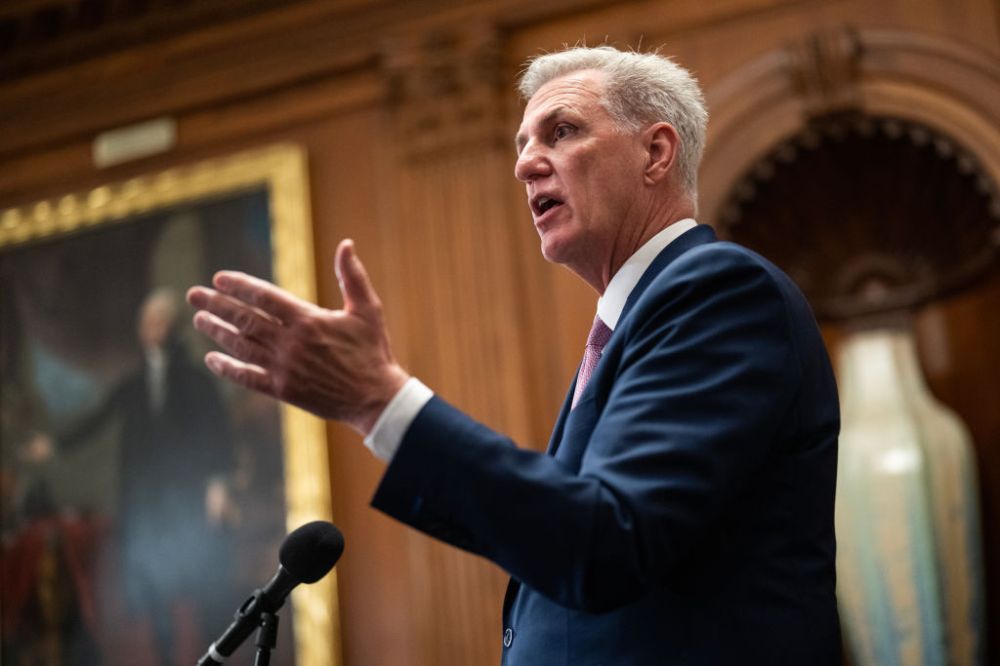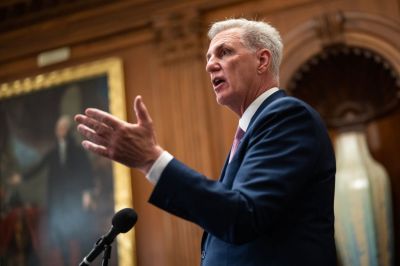House Speaker Kevin McCarthy likes to chide Capitol Hill reporters for underestimating his ability to push through legislation with a slim but fractious Republican majority. Yet even he has acknowledged that the House will fall short of his goal of passing 12 appropriations bills by September 30.
The House will return from its August recess on September 11 with only one of the bills to fund the U.S. government passed. Even if it could pass those dozen measures, all of them would need to be reconciled with the Senate’s versions. Instead, what looks all but assured is a continuing resolution (CR)—a bill temporarily extending current funding levels—to extend the appropriations deadline.
But members on the right flank of McCarthy’s conference say they won’t accept a “clean” CR. Their demands, which Democrats and some Republicans find unpalatable or even unacceptable, make a government shutdown in early October increasingly likely.
“My guess is we will have a lot of screaming and shouting and we’ll end up shutting down the government,” Utah Sen. Mitt Romney said in an interview with KSL News on Sunday.
The circumstances are similar to those in late May during negotiations over the debt limit, except then the consequence was the government defaulting on its debt. The consequences of a shutdown are less catastrophic, but the Freedom Caucus may have more political leverage to force McCarthy’s hand this time: Actual budget appropriations are a bigger deal than agreed-upon budget caps, which mostly serve as guidelines for the appropriations process itself.
The Freedom Caucus’ demands, laid out in a letter released last Monday, are at points vague. For example, the group says it will “oppose any blank check for Ukraine in any supplemental appropriations bill”—but what counts as a blank check is left undefined, and many members of the Freedom Caucus voted for the House’s National Defense Authorization Act (NDAA) in July, which included $300 million in Ukraine aid. Its members also want any CR to “address the unprecedented weaponization of the Justice Department and FBI” and “end the Left’s cancerous woke policies in the Pentagon.”
More substantively, the group says it will withhold support for any CR that doesn’t include the Secure the Border Act, an immigration-related bill that would resume construction of Donald Trump’s border wall and enhance surveillance at points of entry. The bill already passed the House earlier this year on a party-line vote. It would be dead on arrival in the Democratic-controlled Senate—which has many Republicans who aren’t members of the Freedom Caucus confused about what the group’s game plan actually is. Plus, Republicans historically have shouldered blame from the public for government shutdowns.
“I understand what they want to get done, and I’m sympathetic to a lot of the goals they want to achieve,” one Republican legislative director tells The Dispatch. “But I just don’t understand the strategy.”
Eventually, McCarthy may be able to coax dissenters to support a CR by crafting border security provisions more acceptable to Senate Democrats, though that may not be enough to prevent a shutdown in the first place. And he has another bargaining chip in his back pocket: the momentum among some Republicans to open an impeachment inquiry into President Joe Biden.
While the three House GOP investigations into the Biden family have legitimate oversight purposes, they also provide a convenient political outlet that another legislative director characterizes as a “diversion.”
“Or a bone—throw them a bone,” he adds.
McCarthy himself has suggested a link between the investigations and government funding issues, emphasizing on Fox News recently that “if we shut down, all of government shuts down—investigations and everything else.”
If the Freedom Caucus persists in its demands, it’s impossible to know exactly how long a shutdown would last. But once it’s resolved by a CR, Congress will simply have a new deadline for determining government funding and more questions about how to accomplish it. The Freedom Caucus has vowed not to allow an “omnibus,” the massive spending packages employed in years past.
If an omnibus passes, “I don’t think McCarthy is speaker anymore,” the first legislative director says, referring to the easier threshold for calling for a vote to vacate the speaker’s chair.
The House could be headed toward a set of “minibuses”—less than 12, but more than one—which would afford members more opportunities to vote their consciences.
Funding for the 2024 fiscal year would ideally be wrapped up by Christmas. But automatic 1-percent spending cuts in the debt ceiling agreement don’t go into effect until April 1. In theory, members across the spectrum could talk themselves into supporting a longer-term CR in hopes of getting a better deal in the spring.
Regardless, McCarthy and his deputies will have their hands full.
“There’s a lot of disagreement,” another Republican legislative director tells The Dispatch. “And absent a significant amount of momentum to pass a CR, we’re headed to a shutdown.”
Second McConnell Medical Incident Prompts GOP Leadership Speculation
Senate Minority Leader Mitch McConnell’s latest public medical event, the second in just more than a month, is stoking speculation about how much longer he’ll be able to serve as the GOP’s party leader in the upper chamber. He has held the position since 2007.
Following the incident in which he froze up for about 30 seconds Wednesday while at a public event in Kentucky, McConnell and his allies have been tight-lipped about the details of his condition but have tried to strike a reassuring tone with both Senate Republicans—and the broader public.
Later Wednesday afternoon, he talked on the phone with the “Three Johns” widely seen as his most likely potential replacements—Sens. John Thune, John Barrasso, and John Cornyn—all of whom have since said the Kentuckian seemed to be doing well. And on Thursday, McConnell’s office released a terse letter from the Capitol’s attending physician medically clearing him to “continue with his schedule as planned.”
“Occasional lightheadedness is not uncommon in concussion recovery and can also be expected as a result of dehydration,” the letter said.
But while it’s not entirely clear what’s causing the freeze-ups, it’s hard to ignore the fact that McConnell’s physical health is visibly worsening since he fell and suffered a concussion in March. Earlier this year, the conventional wisdom was that McConnell would serve as party leader at least through the rest of this Congress. That’s now in more doubt than before.
Under Senate Republicans’ conference rules, five senators can call for a full conference meeting, and a small group of senators is reportedly considering doing so in order to have a discussion about leadership. (As conference chair, Barrasso has the ability to call a meeting at any time.)
But in order to actually force a vote on new leadership, a majority of Senate Republicans would need to get on board. Given the Three Johns’ close ties to McConnell—and the lopsided results of Sen. Rick Scott’s challenge to McConnell in the most recent leadership election in November—that would be unlikely unless and until McConnell himself decides it’s time to pass the torch.
Regardless of the exact timeline, McConnell’s eventual successor will inherit a conference that is difficult to hold together, especially on foreign policy issues such as aid to Ukraine. But while some of the challenges of the job may be new, others have been features of working in the Senate for decades.
“It’s like having 50 small businesses or 50 fiefdoms, and you’re the king of that domain,” a former GOP leadership aide tells The Dispatch. “It’s not like the executive branch. You’ve got to work behind the scenes to legislate.”
“McConnell has been in the job for so long that there are generations of reporters and staffers that don’t know what DC is like without him as leader,” the aide adds. But the Three Johns are “all great members” who are prepared to step into the role.
“They’ve been laboring for years in ways that don’t get the headlines.”
On the Floor
The Senate will reconvene on Tuesday, and the House will return on September 11.






Please note that we at The Dispatch hold ourselves, our work, and our commenters to a higher standard than other places on the internet. We welcome comments that foster genuine debate or discussion—including comments critical of us or our work—but responses that include ad hominem attacks on fellow Dispatch members or are intended to stoke fear and anger may be moderated.
With your membership, you only have the ability to comment on The Morning Dispatch articles. Consider upgrading to join the conversation everywhere.